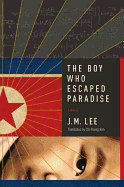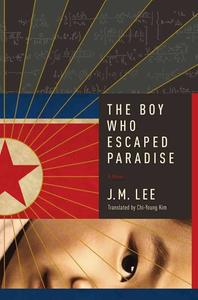
 In The Investigation, his first novel translated into English, Korean author J.M. Lee celebrated the arts. His follow-up pays homage to the beauty of numbers. The Boy Who Escaped Paradise is the extraordinary story of a math savant told through his own words. From a prison hospital--where he's being held by U.S. officials on suspicion of murder and 11 international crimes--21-year-old Ahn Gil-mo relates his journey across the globe to a nurse who shares his love of numbers.
In The Investigation, his first novel translated into English, Korean author J.M. Lee celebrated the arts. His follow-up pays homage to the beauty of numbers. The Boy Who Escaped Paradise is the extraordinary story of a math savant told through his own words. From a prison hospital--where he's being held by U.S. officials on suspicion of murder and 11 international crimes--21-year-old Ahn Gil-mo relates his journey across the globe to a nurse who shares his love of numbers.
The son of an esteemed physician in North Korea, Gil-mo attends an excellent school catering to his mathematical gift. Lee offers the first glimpses of North Korea's hostile human rights environment when Gil-mo's father's medical license is revoked because he was unable to save a mortally wounded high-ranking military officer. The family continues to survive amid famine until officials arrive at their front door and drag Gil-mo's parents away.
His father returns long enough to collect him, and the two are banished to a prison camp because, as the boy learns, his father was discovered practicing Christianity. He never sees his mother again, and his father, like many others, dies from the hard labor and lack of food, leaving the son at the mercy of those who want to take advantage of his innocence and valuable skills.
Gil-mo's affinity for numbers lands him an easier job with Mr. Kang, working with foreign currency. He spends his days completing the computational tasks Kang assigns him, finding ways to improve the efficiency and profitability of the camp. It is here that Gil-mo makes the promise he spends his life fulfilling, no matter the cost: looking after Kang's daughter, Yeong-ae.
With regular allusions to Homer, Lee takes his modern-day Odysseus on a journey of epic proportions after he escapes the camp in order to keep his promise to Kang. The characters Gil-mo encounters as he follows Yeong-ae's trail from Asia to North America rival the complexity of Homer's. From the compassion of Gil-mo's best friend who gives him his gloves as Gil-mo is carted away, to the vile greed of the prison camp warden who profits from the boy's naiveté, a spectrum of players make The Boy Who Escaped Paradise riveting.
The novel is a reminder of the power of numbers, but one doesn't need to be a math fan to appreciate the brilliance of this work. The language is mesmerizing, illustrating the logic of Gil-mo's mind as clearly for the audience as it functions for the boy:
"I turned on my computer and went to a stock market site, watching tame numbers appear on the screen. Through graphs and tables, I herded them to a meadow by a calm stream. They listened to me and grazed where I directed them."
To say any more would spoil the plot. An exciting adventure added to rich characters, all multiplied by stunning language, equals an unforgettable novel. --Jen Forbus, freelancer
Shelf Talker: A young North Korean boy with a penchant for numbers leaves a trail of crimes across the world in order to fulfill his promise.

